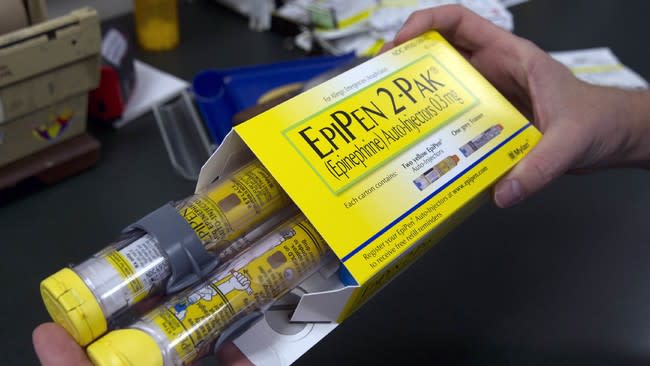What to do if you experience a food allergy on vacation like RHONY's Bethenny Frankel

This week’s Real Housewives of New York tackled some problems we wish we had — only being able to afford silver Tiffany necklaces for all your friends on your girls’ trip to Cartagena, Colombia — and one very relatable issue: food allergies.
Just after sitting down for lunch made by professional chefs in a fabulous vacation home, Bethenny Frankel took a sip of fish soup and suffered an immediate allergic reaction. Her throat became itchy right away, and in the next scene, we see her curled up on the floor in front of the toilet.
While just taking a Benadryl was enough to get the reality-TV star back on her feet and ready for more RHONY bickering, she’s fortunate the reaction wasn’t more severe, according to Dr. Purvi Parikh, an allergist/immunologist with the Allergy & Asthma Network.
“If you have any reaction involving vomiting or [trouble] breathing, you shouldn’t just say, ‘OK, I’m going to go back about my day,’ ” Parikh tells Yahoo Lifestyle. “It’s a sign that it’s a bigger systemic problem.”
No one wants to spend their vacation in the hospital, so here are some steps to take if you have any allergic reactions to food while you’re away from home.
Get diagnosed before you leave home
If you have ever had even a mild reaction to a particular food, such as an itchy tongue, rash, or flushing, in the past, get yourself to a doctor.
“They should get tested by a board-certified allergist to know for sure what they’re allergic to,” Parikh says. This way you will know exactly which foods to avoid, and you can get a prescription for an epinephrine auto-injector, aka an EpiPen.
The eight most common food allergies in adults are fish, shellfish, milk, eggs, wheat, soy, tree nuts, and peanuts. Some people develop food allergies as children, but some allergies, particularly allergies to fish or shellfish, only present themselves in adulthood.
Tell everyone
Be that person who advertises your allergy to all your friends and family, and especially to the staff at restaurants, hotels, and airplanes. And then repeat yourself.
“Sometimes people are embarrassed about it, but I always tell people, this is your life, it’s your health,” Parikh says. “If you tell people, they can help you and watch out for you too. The more you advocate for yourself the better, in these kinds of situations.”
This advice certainly would have helped Frankel, since apparently only her frenemy Ramona Singer knew of her allergy and conveniently forgot about it. Had Frankel told all her friends and the chef hired for the house, well, the episode would have had one less plot point but also one less life-threatening incident.

Carry two EpiPens
Your doctor should prescribe you two devices, and when you travel, you should keep both in your carry-on luggage.
“There are cases where you need more than one, depending on how severe the reaction is,” Parikh says. “Or one may malfunction.”
Know all the signs of an allergic reaction
In addition to itchy throat or tongue, rash, and flushing, Parikh says some people experiencing anaphylaxis (the term for a severe allergic reaction) have trouble breathing, coughing, stomach cramps, diarrhea, or vomiting. You can find a more extensive list of symptoms at FoodAllergyAwareness.org.
Use the EpiPen right away
Some people may be inclined to do as Frankel did and just take a Benadryl at the first sign of an allergic reaction, but Parikh says this can be a deadly mistake, because Benadryl takes around 30 minutes to take effect. If you experience any of the signs above, inject the epinephrine right away, and if you don’t have an EpiPen, call 9-1-1.
“We’ve seen instances where people delay using [an EpiPen], and unfortunately it has cost them,” she says. “The nature of this type of reaction is that timing is everything. To wait for the ambulance or to go to a hospital, it may be too late for you, and we’ve seen that happen many times for children and adults. We don’t want people to have a false sense of security with Benadryl, because sometimes they take it and think, ‘Oh, I’ll be OK.’ And they’re losing precious time.”
See a doctor right away
After using the EpiPen, you should still see a medical professional to get your vitals checked and be sure you don’t need further help. Some severe reactions could require further treatment. The good news is that the EpiPen has bought you time, so you don’t necessarily have to go to the emergency room but can visit an urgent care center or a doctor’s office, Parikh says.
Don’t confuse intolerance with allergy
We live in an age of hyper-awareness of our diets and digestive systems, so often people will feel uncomfortable after eating certain foods and declare themselves allergic. This isn’t necessarily the case.
“An allergy is when your immune system and all of your organs are involved in actively rejecting that food or allergen,” Parikh explains. “Intolerance is more like a side effect.”
It’s vital that people with intolerances or preferences not confuse the two. Doing so may be make everyone less likely to take real food allergies as seriously as they should.
The good news is that the rise of food allergies has also meant a rise in research to cure them. So far, there’s been some progress in methods, such as a patch to desensitize people with peanut allergies.
“There are advances on the horizon,” Parikh says. “It’s not a cure yet — someone can’t go and eat a Snickers bar — but it’s a nice layer of protection and less anxiety for people and their families that suffer from this.”
Read more from Yahoo Lifestyle:
Follow us on Instagram, Facebook, and Twitter for nonstop inspiration delivered fresh to your feed, every day.
